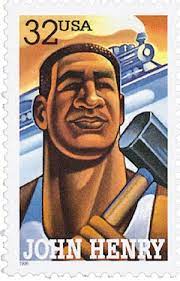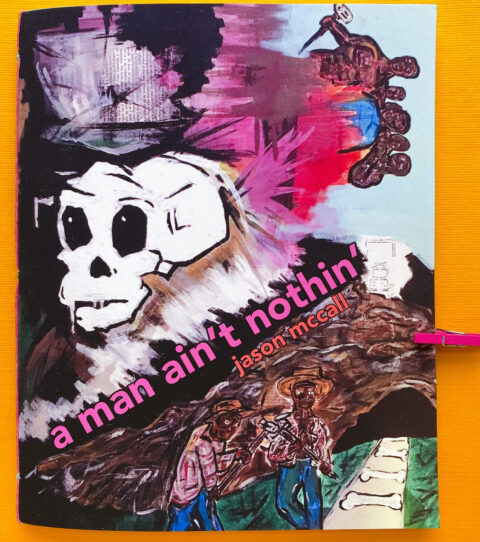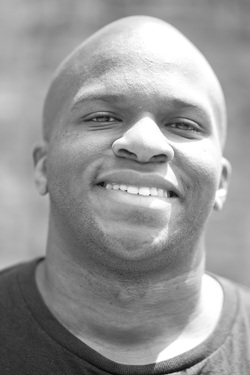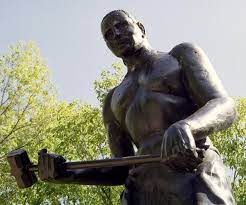According to historians, John Henry was a formerly enslaved Black man born in Alabama who helped to dig railroad tunnels. But historians disagree on which tunnels he helped build, or even where he fought his legendary battle against the steam drill. The US Postal Service portrays John Henry as an American folk hero, immortalized in its “Folk Hero” stamp series alongside Paul Bunyan, Pecos Bill, and Mighty Casey. On the stamp, John Henry smiles, a sledge-hammer slung over shoulder, a steam train screeching behind him set against an orange sky. His expression suggests satisfaction with a job well done. He represents an extraordinary laborer who competed against a machine with his sledgehammer and won.
 Ezra Jack Keats’ 1965 picture book calls John Henry the “personification of the medieval Everyman who struggles against insurmountable odds and wins.” The famous folk song says: “John Henry was a little baby, sitting on his papa’s knee / He picked up a hammer and little piece of steel / Said “Hammer’s gonna be the death of me, Lord, Lord.” The blues ballad, “John Henry”, a tune covered by Lead Belly, Woodie Guthrie, Leon Bibb, Johnny Cash, Mississippi John Hurt, among others, says he was “steel-driving man,” a railroad worker who gave his life to for the South.
Ezra Jack Keats’ 1965 picture book calls John Henry the “personification of the medieval Everyman who struggles against insurmountable odds and wins.” The famous folk song says: “John Henry was a little baby, sitting on his papa’s knee / He picked up a hammer and little piece of steel / Said “Hammer’s gonna be the death of me, Lord, Lord.” The blues ballad, “John Henry”, a tune covered by Lead Belly, Woodie Guthrie, Leon Bibb, Johnny Cash, Mississippi John Hurt, among others, says he was “steel-driving man,” a railroad worker who gave his life to for the South.
The dream of the New South required heavy investment in railroads — men to lay tracks, build bridges, and do intense manual labor; it was forged in the blood of those workers. Behind John Henry’s legend lies the legacy of slavery, convict leasing, and internment camps during early industrialization. To be clear, John Henry died of exhaustion. The race against the machine killed him. And one must wonder what it means to win by dying. What does a man win except a song and a statue?
*
In his fifth poetry book, A Man Ain’t Nothin’, Jason McCall probes the relationships between heroes, statues, blues, music, labor, and Black life. Born in Alabama, raised in Montgomery, and now teaching at the University of North Alabama, McCall follows the legend of John Henry through the myths. The book is dedicated to sweat: “For all the sweat I’ve given the world, and for all the sweat the world has given me.”
 Using sweat as a symbol for Black labor, pain, and work, McCall employs idioms that expand throughout the text, returning to the labor which built a country founded upon the promise of white supremacy. Both formally and thematically, McCall’s poems enact a refusal to “buy-in” to the accommodations of a New South while seeking to identify the price of those railroads in himself.
Using sweat as a symbol for Black labor, pain, and work, McCall employs idioms that expand throughout the text, returning to the labor which built a country founded upon the promise of white supremacy. Both formally and thematically, McCall’s poems enact a refusal to “buy-in” to the accommodations of a New South while seeking to identify the price of those railroads in himself.
The poems convene around a bronze, 3-ton statue of John Henry located in Talcott, West Virginia. Inaugurated in 1972 to mark the 100th anniversary of a tunnel’s completion, the piece’s sculptured muscularity provides an image of raw physical power. But it is also riddled with pockmarks resembling bullet holes, a legacy of vandalism in white paint. McCall’s poem, “John Henry’s 8 Foot Tall, 3 Ton Statue Has Been Moved for Its Own Safety,” is titled after a news headline announcing the movement of the statue to another location in July 2012 to protect it from vandalism. The poem continues across seven tercets, ending with the juxtaposition of statue and Black male bodies in the present:
the howl of all the triggers,
the pop of every bullet breaking through
boys not made of bronze.
Laying vulnerability against the physicality of monumental strength is a theme for McCall. In untangling the man from the myth, McCall evokes multiple landscapes, fashioning a collage of excerpts from novels, rap songs, legal statutes, film dialogue, and news media. Headlines and quotations are used as titles, giving the poems the feel of found objects.
Titles also do the work of self-referencing, establishing language as textual monument, and setting the stage for what the poems will contest. For example, “Well, John and Henry were the most common names for freed slaves, so if there was a record of him, it wouldn’t mean that he was the John Henry,” is titled after dialogue from Colson Whitehead’s novel, John Henry Days. The attempt to find John Henry becomes an attempt to define John Henry through repetition, beginning: “John Henry is every black man. John Henry is every black / man trying to breathe.”
Structured by the anaphora “John Henry is …”, the poem locates Henry by contrasting vulnerable representations and monumental images. The Black male body is the site of impossible reclamation, the line of legislation and criminality erected to serve the state. The narrator concludes:
John Henry is every
black man flexing in the mirror and not knowing if he should
be proud or terrified.
“Be it enacted” begins with a lengthy excerpt from the 1903 Alabama vagrancy law used to “imprison citizens and provide labor for the state’s convict leasing program,” as explained in the end notes. The vagrancy statute equated “idleness” with criminality; it stigmatized “wandering or strolling about in idleness.” Convict leasing relied on criminalization of open leisure: displaying one’s leisure in public marked the relaxed body as guilty of not owning private property, or lacking the land and means to privatize leisure outside of the shared public space. As I read the statute, I was reminded of Ross Gay’s essayette which celebrates loitering as a creative act in defiance of capitalist work ethic.
Crossing several pages in couplets, “Be it enacted” invokes a call-and-response rhythm, tracing the use of enslaved labor across the map of Alabama mines and prisons. The speaker attempts to situate his own life as a Black poet and professor in this system of trying to buy back freedom, to purchase one’s “independence” from Alabama:
And really, this new job, this new ID, this
poem won’t stop one siren
or sentencing guideline. It’s all about me
buying my independence back from an Alabama
that swore I could afford to live
a free life if I was willing to
sweat enough. It’s all about me still trying
to pay off the debt I took on
to buy into that lie.
The use of the conditional, if, designates the labor, the unspoken contract of bootstraps; images of coal, fire, and labor coalesce; the repetition of the word fire creates a relation to the word free; figurative language keeps circling this abstract noun, asking what it means to be free in the context of white supremacy. How does history continue the lies and erasures in legends? Is using a Black man’s body as a work-til-you-drop myth also a form of erasure?
*
Modern notions of Progress depend on a mythologizing of labor: work purifies, redeems, saves, creates value. (This deified labor-ethic drove industrialization in Soviet Russia as well as capitalist nations.) To listen to American blues ballads and folk songs about John Henry is to remember poetry’s ancient role in immortalizing heroes. The ode, the elegy, the requiem, the epic, all these early poetic forms served as vehicles for preserving myths and making heroes. This book narrows the margin between the statue (or monument) and the text as forms for historical preservation.
McCall’s interpolations of ancient mythology, pop culture referents, and historical texts verge near dirges, a neo-dirge that dredges the past; the tone is mournful, uncertain, often hopeless. He rattles the entire industry of American dreams — its Black heroes and statues — as applied to formerly enslaved persons and their ancestors. Take “Bury Me in Gold #2,” where McCall rejects the academic comparison of Henry to Ulysses, offering instead the Black knowledge of Henry as Hector:
a body bound, a body dragged
around the world as a warning,
a body made by the gods
to show all the ways gods can break a body.
McCall does brilliant things with myth, borrowing both theme and form. Hector was the Trojan warrior-hero who led the Trojans to victory in defense of Troy only to be killed by Achilles. The word hector comes to use from late Middle English, where it denoted a hero, referring to Hector’s triumphs. By the 17th century, hector had come to mean “braggart or bully,” referencing a member of a gang of young Londoners, and its verb form meant to “talk in a bullying way.”
 Substitute a Greek chorus for a choral refrain, a couplet McCall borrows from Big K.R.I.T.’s lyrics; the tone is defiant, determined, but also hopeless: “The chains ain’t the chains they chained us up with. / The rope ain’t the rope they hanged us up with.” This refrain traces rap’s lineage into the transgressive blues tradition of refusing to bend in the shape of suffering demanded by whiteness.
Substitute a Greek chorus for a choral refrain, a couplet McCall borrows from Big K.R.I.T.’s lyrics; the tone is defiant, determined, but also hopeless: “The chains ain’t the chains they chained us up with. / The rope ain’t the rope they hanged us up with.” This refrain traces rap’s lineage into the transgressive blues tradition of refusing to bend in the shape of suffering demanded by whiteness.
The tension between being a monument and being human is physical, tactical, musical — a turnt lament. McCall circles around the division between “blackface” and “black faces” in “We Want Some Brothers up on the Wall,” titled after dialogue in a Spike Lee joint. Set in the halls of academia, where posters are used to represent diversity, history, and relevance, the poem works two long, ragged stanzas that turn on repetition (brothers, wall) and the redefinition of words. The narrator mentions “counting the number of black faces” in every room he enters, only to find himself “a slave / to the mathematical proof” of using Black faces to signify in a country where “one black face = infinity or zero.”
Working the negatives, running back and forth across the lines, creating friction and uncertainty, the narrator exposes the portrait:
I don’t know how
to love a black face because I never wanted to
see my own face as anymore more than a rental
that wasn’t likely to make it
past its warranty.
After likening his face to an impermanent commercial product, a rental for use, drawing a line between academia and the production of tokenism, resting for a moment in the pain of feeling used, McCall ends with: “I’m the heat making the world / squirm and scowl and hate/ God for making me.”
 “For 95 Bodies Found on the Imperial Sugar Plantation” is an elegy invoking normalization of torture in labor and production. The narrator brings ghosts into the poem to serve as shadows for the crimes of history where a young black child sweats “over a calculus midterm.” The reversals of syntax break linearity, bringing a sense of circularity into the distance between then and now, which the poet revokes. “Those ghosts aren’t / in any hurry to leave,” the narrator says. The ghosts will not die or disappear to please the myth of Alabama — and some poets hear them. And the line breaks snap, snap, snap, pivoting around repetition of the number 95 (“95 boxes of black bones”; “95 ghosts / being only 95 ghosts”). The school room is haunted by the unspoken.
“For 95 Bodies Found on the Imperial Sugar Plantation” is an elegy invoking normalization of torture in labor and production. The narrator brings ghosts into the poem to serve as shadows for the crimes of history where a young black child sweats “over a calculus midterm.” The reversals of syntax break linearity, bringing a sense of circularity into the distance between then and now, which the poet revokes. “Those ghosts aren’t / in any hurry to leave,” the narrator says. The ghosts will not die or disappear to please the myth of Alabama — and some poets hear them. And the line breaks snap, snap, snap, pivoting around repetition of the number 95 (“95 boxes of black bones”; “95 ghosts / being only 95 ghosts”). The school room is haunted by the unspoken.
“I don’t need John Henry / with a bootstrap epilogue,” McCall explains, balancing what the narrator needs from needs from the man with what he expects from himself in “I Need John Henry.” The narrator reclaims John Henry by rejecting the legend constructed around his death. The first line of the first four couplets is the anaphora “I don’t need John Henry,” thus demolishing the legend. In the fifth stanza, McCall begins to rebuild, and the anaphora “I need John Henry” leads the final four stanzas.
I need John Henry
leaving his hammer in the Alabama muck so it can grow into
Brittany Howard‘s voice.
In the long, winding single-stanza poem that is “I’m Glad John Henry Died,” McCall references the relationship between the “beat” of Henry’s “twenty pound hammer,” and Black music:
Because my body never helped anyone
invent the blues that invented all
the hustler anthems.
“Ask me why / every black song is a dirge,” the poet continues in this poem about “all the men who died” for him “but didn’t stay dead.” This counter-requiem for the ghosts of Black boys and fathers continues in “John Henry’s Son Plots Revenge,” where the absence of a statue serves as a counterpoint to the presence of Confederate monuments on the southern landscape. John Henry’s son “knows the root of revenge / means to punish and to claim”; and he will stalk the books, the academic hallways, “use every hour of the rented day” to end the poem:
to calculate the size of a hammer
he’ll need to open a wound in the world
big enough for the world to fall inside.
The book’s final poem destroys everything. In “My great-great-great-great Grandfather Was a Railroad Man Who Owned my Great-great-great-great Grandmother and Shares My Birthday,” McCall returns to the counterpoint between a Greek Hector myth and an American John Henry legend, interrogating his own fascination with the Trojan war. One discovers the poet’s relationship to railroads: a family bulletin reveals an ancestor who was a slave-owning while railroad man that came into town to work on railroads and left his ancestor pregnant:
My love
for Hector and Homer finally makes sense
because the darkest part of my blood was teaching me
to love rapists years before I discovered these names.
And there is the endless whirring of the wheels in these lines, the motion and cadence of McCall’s face in a mirror, trying to navigate what is owned in his blood. What he owes in the moment before brushing legendary male heroes aside for a different model, namely a sky which includes his great-great-great-great grandmother:
And the beautiful poem lets me hold her
in the light and shame the sun for shining
on a world that did what it did to her.
And the beautiful poem would say that she shines
through me when I learn to take all the spikes
this country drives into me and transmute them
into Orphic songs that wake the dead and pull the earth
The line between white supremacist values, labor, and heroism is the track McCall rides in this chapbook. It runs through him, haunted by the lyrics of the folk song where John Henry tells his employer: “A man ain’t nothing but a man / But before I let your steam drill beat me down / I’d die with a hammer in my hand.”
In rejecting the attempt to make a hero of a man who was worked to death, the poet raises larger questions about the Protestant work ethic and the ever-chugging engines of capitalist meritocracy, where working to the point of dehumanizing exhaustion is laudable, and key to advancement. I keep thinking about heroism and heroes — and how McCall uses Hector and Greek myths as counterpoint to John Henry. Jason has broken his own plaster cast. He has smashed it with love for his female ancestor. He has flipped every single singed script. And he has left with no statue, no work-song, no hero: only a sky to respect.
[Published by Pork Belly Press on March 15, 2021, 46 pages, $10.00 paperback]
One comment on “on A Man Ain’t Nothin’, poetry by Jason McCall”